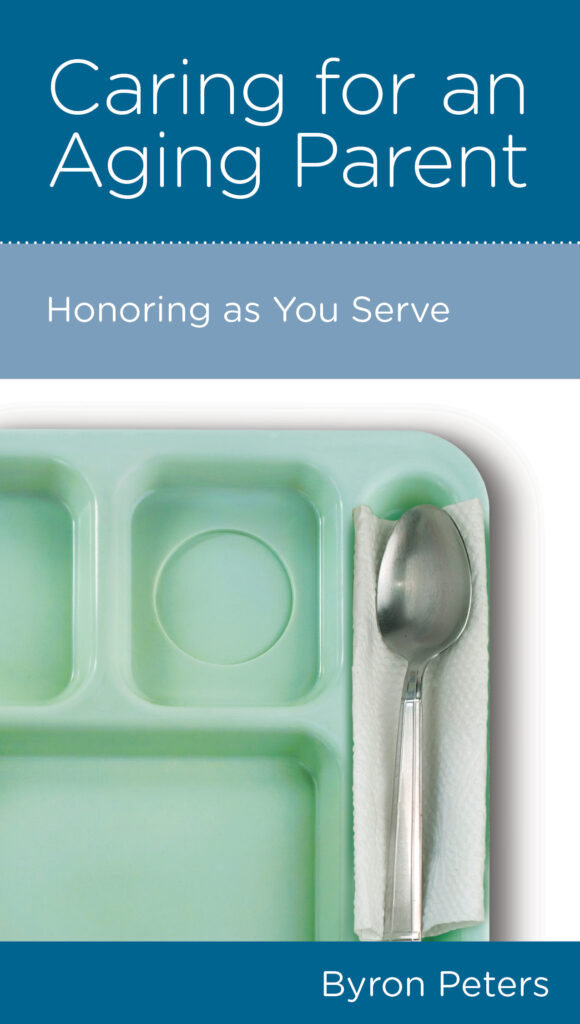Ask any adult child caring for an aging parent what they are experiencing and how they are doing and you’ll hear things like: “All told, Mother is doing okay, but money’s tight. It’s about time Dad stops driving—that will be hard! Yes, it’s a lot to juggle with the kids and work. I definitely feel the tension with my siblings. I’m not very pleased with the home she’s in, but there aren’t many options. I’m tired. He’s lonely without mother. We’re taking it a day at a time.”
When my mother was diagnosed with Alzheimer’s in 2002, we had no idea her decline would stretch over fifteen years. Looking back, I wish we had been more proactive in helping her face the loneliness, had paid closer attention to her medications, and given more proactive attention to making her home a safer place. But in the midst of it, how do you know what to do? How do you “honor your father and mother” when they are hundreds of miles away and declining ever so slowly? What conversations should you be having with them and your siblings? How do you begin to prepare for a future with a certain end but an uncertain path to it?
Caregiving can be a long and painstaking journey. It requires enormous doses of patience, wisdom, kindness, and organization ladled out day after day, often unnoticed and unappreciated. But for the Christian, it glows with the promised presence of Christ: “Never will I leave you, never will I forsake you” (Hebrews 13:5 NIV). Jesus enters into the aching loneliness, the fretful pain, the demented confusion, directing and empowering his people for the quiet work of love and service.
Stepping Up to the Challenge
Luke 9:18–36 marks a very important phase in the training of Jesus’s disciples. First, Jesus reveals his identity as “The Christ of God” (v. 20 ESV). He explains that this means he will suffer, be rejected, killed, and on the third day be raised to life. Jesus then reveals his demands in verse 23: “If anyone would come after me, let him deny himself and take up his cross daily and follow me.” In other words, following Jesus means we will experience the same sorts of difficulties he experienced.
About eight days after this encounter, Jesus took Peter, James and John up on a mountain, where he was transfigured (v.29). Glowing in dazzling glory, Jesus’s eternal and essential deity was briefly unveiled and he spoke with Moses and Elijah of his impending “exodus”—his death and resurrection by which he would deliver his people from their sin. And to top it all off, suddenly they were enveloped in a cloud from which came the voice of God the Father: “This is my Son, my Chosen One; listen to him!” (v. 35).
It’s hard to imagine all that went through the disciples’ minds as they walked down that mountain, but it wasn’t long until they were back in the thick of life and all its characteristic challenges. But the Mount of Transfiguration had changed them. Not so much because they had seen Moses and Elijah (though that would be quite amazing!), but because God had given them a key to navigating the self-denial and cross-bearing required of the followers of Jesus. He had told them this: “Listen to my Son.”
Following the Example of Jesus
Caregiving is rarely a mountaintop experience. It seems to have much more in common with self-denial and cross-bearing. But God has given his people all we need for the day-to-day selfless love he calls us to as we give care to the aged. He has given us his Word (Psalm 119:105; Hebrews 4:12). And his Word maps the riches of Christ onto all the realities of life because it is “breathed out by God and profitable for teaching, for reproof, for correction, and for training in righteousness, that the man of God[a] may be complete, equipped for every good work.” (2 Timothy 3:16–17).
How does this relate to caregiving? Over time, if you stay engaged in the Word, you can start finding your feet as a caregiver. You toughen up, learn the value of cheerfulness, get in the habit of regular communication, learn the art of loving and (at times) firm advocacy. You realize that no one has the same interest in your parents’ well-being as you and your family do—so you step up. You build stamina and come to appreciate the value of community in ways you never envisioned before. Things begin to clear as the Holy Spirit connects the riches of God’s Word to the particular challenges of caregiving.
“But the path of the righteous is like the light of dawn, which shines brighter and brighter until full day.”
Proverbs 4:18
David Powlison suggested that our list of anxiety-producing worries is always finite. I have found this principle to be true in caregiving. Once I identified and named the various challenges, I could address them one at a time. Distance was a factor for me, so I determined to phone mother each evening. The consistency was good for both of us. My periodic longer visits became opportunities for the helpers to get rest and me to get a closer look at how she was being cared for. I learned to live those days at a slower pace and simply enjoy mother for who she was now rather than live wishing things were different. Practical insight was so helpful, like that of a friend who had spent a year of his medical residency working with Alzheimer’s patients. He said, “The advantage I have is that I didn’t know these dear people as they were. I simply know them as they are. As people who have intrinsic value and who, despite their disabilities, are enjoyable, gifted, and engaging.” I learned that caregiving is constant, but it doesn’t have to be frantic. I learned to pull out the old pictures, laugh again at the old stories, and wander together down memory lane (often times traveling the same path several times in an hour). An activity that used to be so anxiety producing became an isle of refuge from the world’s relentless demand for productivity at any cost.
Caregiving with Love in Changing Seasons
After twelve years at home, we moved Mother to Durham, where we lived, to be in the care of a nursing home. That was a bit of a wakeup call. But by respecting and engaging with the (often overworked and underpaid) staff, and by “getting our hands dirty”—changing her diapers, feeding and bathing her, cutting her toenails, and changing her sheets, the staff began to realize we expected excellent care for Mother and were willing to help provide it (“For even the Son of Man did not come to be served, but to serve” Mark 10:45). That partnership and those relationships paid dividends, and Mother was (mostly) clean and well cared for.
Soon we developed relationships with other residents and their families. One became my surrogate mother, and soon she and I began conducting a worship service for the residents. Many Sunday afternoons would find Mrs. Scott, Mother, and I sitting by Mom’s window just sharing time together (and maybe a bit of ice cream).
We’re in the middle of a time where you wouldn’t be able to be involved at the nursing home now as I was then, but I pray that one day families will be able to be more active in the lives of their loved ones in homes. If you are in the situation now where your loved one needs to be in the care of a home, my heart is especially with you.
Caring for an aging parent is certainly filled with challenges, especially for those with limited time or finances. It will likely require changes and adjustments you would not otherwise choose. It will expose selfishness you never knew was in you. But in spite of all that, it is good work because it is Christ’s work. Because (and we all know this), of all that demands our attention, of all that screams for our focus, it’s loving God with all our heart, mind, soul and strength and loving our neighbor as we love ourselves that matters most. And our parents are our nearest neighbor, for whom we bear particular responsibility (1 Timothy 5:3–16). Aging is hard, but it is also a gateway into selfless service where we learn to lay aside our desires for the benefit of another. And in the process, we begin to understand what it means to love.

CARING FOR AN AGING PARENT: HONORING AS YOU SERVE
Caring for aging parents is complex and challenging even under the best of circumstances. How do we help them and remain sane when distance, dementia, depression, disaster, divorce, disintegrated relationships, deteriorating health, and discouragement set in?





